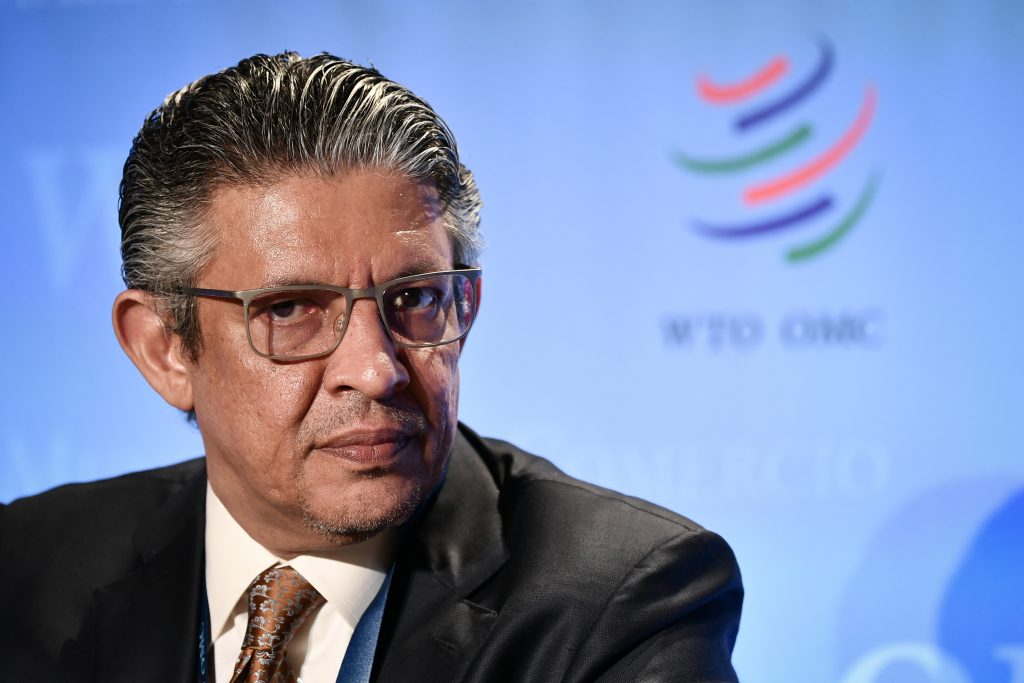
- ARAB NEWS
- 18 Jul 2025

When World Trade Organization (WTO) Director General Roberto Azevedo announced in May that he would be stepping down from his position a year early, the race to take up one of the world’s most important positions started. On July 8, Saudi Arabia entered Mohammed Al-Tuwaijri as its official candidate. Altogether, there are eight candidates, among which we find famous politicians such as the UK’s Liam Fox and Nigeria’s Ngozi Okonjo-Iweala.
Al-Tuwaijri is uniquely qualified for the position because he is the only candidate who combines government experience with a serious private sector background. He currently holds the position of minister advising the royal court on international and local strategic economic matters. He was minister of economy and planning from 2016 until March and was instrumental in integrating the UN’s Sustainable Development Goals (SDGs) into Vision 2030, of which he is a staunch supporter. Al-Tuwaijri put great emphasis on performance management and measurement. The International Monetary Fund and World Bank, as well as the WTO, fell into his remit as a minister.
What sets Al-Tuwaijri apart from the other candidates is his long and deep private sector experience.
Cornelia Meyer
A former fighter pilot and holder of an MBA degree from King Saud University, he rose through the ranks of international banking, last holding the position of HSBC’s deputy chairman and CEO for the Middle East, North Africa and Turkey. Running a big and important region for an international bank is a sign of excellence because major financial institutions are meritocracies, only giving such positions to the most capable.
So that is the man, let us now look at the organization. The WTO was founded on Jan. 1, 1995, under the Marrakesh Agreement, which had been signed by 123 countries. It replaced the General Agreement on Tariffs and Trade (GATT) of 1948. The WTO monitors trade issues and provides a framework for trade negotiations. Its third function is the dispute settlement mechanism, the importance of which cannot be underestimated.
The organization’s Doha round, which is geared at more inclusive globalization for developing countries, remains incomplete. Issues of agricultural subsidies and non-tariff trade barriers proved to be major stumbling blocks.
It was a highlight for the organization when China joined in 2001. It also proved important for Beijing, as WTO membership provided an important foundation for the following years of economic growth. Saudi Arabia joined the WTO in 2005.
A fair and well-functioning trading system is incredibly important, not only for the global economy but also for sustainable and equitable growth, as well as for the achievement of the 17 SDGs. It was, after all, trade that lifted hundreds of millions of people out of poverty over the last few decades.
The dark clouds of protectionism had been gathering long before the US and China embarked on their trade confrontations, but they have certainly intensified over the last three years. What is particularly troubling is the potential gridlock of the trade dispute mechanism if retiring judges cannot be replaced.
One could argue that a functioning WTO is now more important than ever. The coronavirus disease (COVID-19) has propelled the global economy into its biggest crisis since the Second World War, perhaps even since the Great Depression. Global trade suffered as borders were closed, supply chains were disrupted and factories shut down. The WTO estimates that worldwide trade declined by 18 percent during the second quarter of this year because of the pandemic.
The organization needs clear stewardship and a reset to reinvigorate the global trade agenda. Al-Tuwaijri’s statement to the WTO council on July 17 delineates a clear and achievable roadmap. It looks beyond maintaining the status quo toward creating a system that is fit for purpose in the 21st century.
Technology has changed the way we live our lives, earn our livings and trade. If anything, the pandemic has accelerated these changes. The Kingdom and its Ministry of Economy and Planning understand the importance of the Fourth Industrial Revolution, i.e., information technology, robotics, artificial intelligence, etc. Anyone who attended last year’s Future Investment Initiative cannot be in any doubt of this. The combination of an epic transformation of the economy and the fallout of the pandemic can either create a perfect storm or be turned into a major opportunity. This is why it is important to have somebody with both government and private sector experience at the helm of the WTO — only somebody who speaks both languages can bring about the changes needed.
The US-China trade disputes seem to be becoming fiercer by the day. These are the world’s two largest economies and no international organization focusing on trade can function if its director general cannot speak to both governments. Saudi Arabia has good and open lines to both Washington and Beijing, and that is important. The Kingdom is also a member of the G20, which gives it additional weight over smaller neutral countries. In his statement, Al-Tuwaijri emphasized the need for the new director general to remain neutral.
The WTO has had its troubles, particularly pertaining to the Doha round. It is in dire need of a fresh pair of eyes assessing what needs to be done. The new person at the helm needs experience, vision, diplomatic savoir faire, and great managerial capabilities. Al-Tuwaijri’s track record suggests he has all four of these qualities.